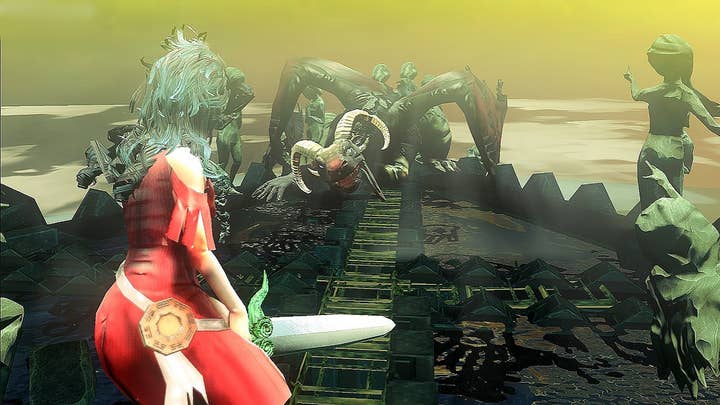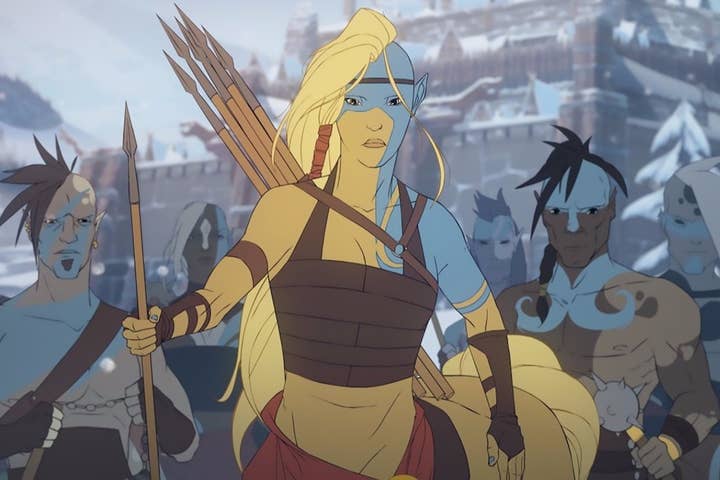Versus Evil: "We're establishing a new brand every time"
More competition and vanishing launch windows make indie publishing an unforgiving environment, says GM Steve Escalante
Whether you want to apply a term like "Indiepocalypse" or not, there's no question that the marketplace for indie games has changed. Successfully launching a product has never been a simple task, but indie-focused publishers are finding it increasingly difficult to carve out space in which to operate.
Steve Escalante, the general manager of Versus Evil, is no great fan of reductive ideas like the "Indiepocalypse," but he can't deny that some of the forces that contributed to its invention are very real. Escalante left the role of marketing director at ZeniMax Online Studios in 2013, with the express intention of working directly with a still emerging wave of independent developers. Versus Evil scored an early success with Stoic's excellent The Banner Saga in 2014, but by the time its sequel was ready for release earlier this year, the goalposts had shifted.
"We launched Banner Saga against 73 titles in the month of January. Banner Saga 2 launched against 380-something, almost 400 titles"
"When we launched Banner Saga, we launched against 73 titles in the month of January," Escalante says when we meet at the BIG Business Forum in Sao Paulo. "Banner Saga 2 launched against 380-something, almost 400 titles.
"So four times more - or even more than that. There's so much content now... The challenge is, you've got traditional press, which helps influence the influencers, and you've got the influencer press. But there's so much content that if you miss a window with them, even if it's only by two weeks, it's kinda hard for them to come back and give you any attention."
Of course, competition is nothing new. It has always been necessary for publishers to locate and build up to a specific release date, with some parts of the year far more inviting to indie publishers than others. However, as the number of indie games has ballooned, those parts of the year have dwindled to the point of vanishing altogether. "Yeah, it's harder," Escalante says. "January used to be a month that nobody launched in. Now all the indies are launching in January, and it's really competitive.
"We have this conversation all the time: 'Well, every window looks like shit, so pick one.'"
The nuance of conversation is often lost on the page or screen, so it's worth noting the hearty chuckle that accompanies Escalante's exclamation. This is not the apocalypse, but a new kind of challenge that companies like Versus Evil must assess, understand and overcome. Indeed, this mounting pressure on indie launches is exacerbated by the changing behaviour of the big publishers, too. As AAA games have become larger and more expensive, the extra risk has led to them spreading out more evenly across a given year. With The Banner Saga 2, Escalante says, an initial multi-platform release date had to be altered and split due to the abrupt entrance of two very big hitters.
"We have this conversation all the time: 'Well, every window looks like shit, so pick one'"
"We hadn't announced it, but we were originally going to come out in May, which was already kinda sketchy. Then Overwatch announced it was coming out in May, and then Total War, and Doom was already there. We were like 'holy cow, let's get the heck outta May.' It went from 'we're gonna launch in May,' to 'y'know what? Let's just launch the PC in April and do console in June or July.'
"Talk about having to be opportunistic, just to pick a good window. I can't compete with Overwatch. Battleborn didn't compete with Overwatch. Things like that make it tough for indies."
The attention paid to No Man's Sky has been described as a turning point for the influence and standing of indie games, but that still required the intervention of one of the industry's biggest companies. The same is true for Jonathan Blow's The Witness, Playdead's Inside and Capy's Below, all of which have been given the kind of exposure by Sony and Microsoft that dedicated indie publishers can't hope to match. And with its Originals initiative, EA is now preparing to do the same. "They're gonna take a lot of good stuff from the market," 11 bit Studios' Paweł Feldman recently told GamesIndustry.biz. "You can't win against that."

So what can you do? For 11 bit Studios the response was to specialise, focusing on "meaningful games" in an attempt to create a clear identity as a publisher. Versus Evil, however, takes a different stance, looking as widely as possible for games - Versus Evil has been working with Brazilian developers virtually since it was founded, hence Escalante's presence at the BIG Business Forum - but ensuring that they meet criteria. Some of these, like having a strong art style, have always been in place, but others have emerged as more important over time. For example, Versus Evil started out as a PC focused company - "There was a lot of corpses in mobile," Escalante says - but even though the company is barely three years old cross-platform is already essential.
"I now need cross-platform. I probably won't sign a game - unless it's just stellar - for a single platform"
"I now need cross-platform," he continues. "I probably won't sign a game - unless it's just stellar - for a single platform. It helps us mitigate the risk. And I'm looking at multiplayer more seriously now, just from a longevity point-of-view." The emergence of Twitch and YouTube as platforms for raising awareness is also an increasingly relevant aspect of what makes a game attractive.
"Anything new that we sign, we're actively talking about how we can embrace those things now. In the past, we weren't nearly as assertive. I wouldn't turn a game down because of it, but at the same time I'm potentially more interested if we can do some Twitch stuff with it.
"What we're doing as an indie company that's so hard is that we're establishing a new brand every time. And even AAA companies struggle with that. When I was at Bethesda launching new IP was a big deal, and [for indies] it's not like: Todd Howard, role-playing games, kickass; id Software, shooters, kickass.
"It's hard. It's very hard, and we're doing that every single time."
GamesIndustry.biz is a media partner for the BIG Business Forum. Our travel and accommodation costs were provided by the organiser.









